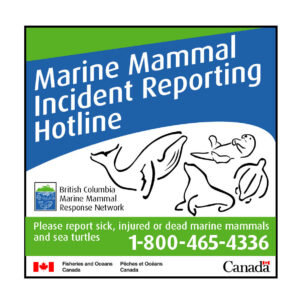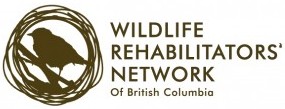CONTACT a wildlife rehabilitator in your area! All wildlife require specialized care if they are to successfully recover and be released back into the wild. As well, stress and shock from improper handling are major killers, and some injured and stressed animals can cause injuries to handlers. Survival depends on prompt and knowledgeable response.
It is illegal to keep wildlife in your possession longer than 24 hours. Never attempt to treat or raise wildlife.
For information on how you can become involved in professional, permitted rehabilitation – visit our Careers Page.
Personal safety is the first priority when attempting to capture wildlife. First, ask the following questions:
1. How long have you watched it?
2. Does the animal appear to be injured (blood, dragging leg or wing, reluctant to move when approached)?
3. Is it in a dangerous location (driveway or roadway)?
4. Is there a dead adult or sibling nearby?
All juveniles are wild creatures and are best raised by their wild parents.

BIRDS
1. Young birds:
- If there are no injuries (and the bird has NOT been caught by a cat), leave it alone. Watch constantly for up to 1 hour to see if any adults return to the area.
- If on a roadway or walkway, it can be safely moved 10-20 feet. Watch for adults.
- If you see dead or adult siblings – the bird needs care. Contact a wildlife rehabilitator immediately.
- If you find a nestling (no or sparse feathering) – return the bird to its nest immediately (it is a fallacy that bird parents will reject young handled by humans). If the nest has been damaged, make a simple substitute and replace as near as possible to the original site. Watch for adults.
- If you find a fledgling (mostly feathered but incapable of full flight) – these birds are newly out of their nest and learning to fly. This process can take anywhere from several hours to upwards of 10 days depending on the species. First watch from a distance for up to 1 hour to see if an adult returns; they are often off foraging for food to return to their young.
- If no adults are seen or there are obvious injuries, the bird will require emergency care. Place in a covered, ventilated box lined with paper towel, in a warm, quiet area and DO NOT FEED (feeding can complicate internal injuries and improper food can be fatal). Contact a licensed wildlife rehabilitator immediately. Wash your hands with soap and water after handling.
2. Adults
- Birds that are injured or oiled can be picked up by approaching with a towel, blanket or jacket (approach from a direction that corners the animal up against a wall, bush or other large object to prevent escape). Cover the animal’s head and use the blanket to scoop the animal up carefully from the sides, supporting the feet from below.
- For adult birds of prey, use heavy gloves in handling and cover the head to minimize movement.
- Place in a covered, ventilated container in a warm location. Contact a wildlife rehabilitator immediately and bring the animal into care. DO NOT FEED (feeding will complicate internal injuries and improper food can be fatal). Wash your hands with soap and water after handling.
NOTE: If you have found a deceased bird, please review the provincial guidelines advising when wildlife agencies should be contacted – and specimens submitted – for mortality investigation studies.

MAMMALS
1. Young mammals
- Young mammals are often left alone by their parents for lengthy periods of time. However, the mother is often nearby. Wild rabbits, for example, only return to feed their young once a day!
- Young mammals have little scent to protect them from detection by predators.
- If you find an orphaned mammal that does not appear injured or ill, leave it alone. DO NOT HANDLE. Return in several hours or even overnight – usually the young will have been moved.
- If not, what is their overall condition? Are they dehydrated (wrinkled skin, sunken eyes, shrunken belly)? Are they soiled with feces, crying out? If they appear well fed and alert, leave them alone. If not, contact a wildlife rehabilitator immediately. DO NOT FEED. Young mammals have very specific milk requirements that cannot be met with traditional commercial formulas – most of which will prove fatal or harmful to their digestive tract. If you have already fed the animal, we must then consider them to be injured and their digestive tract compromised – and the animal must be then brought into a licensed rehabilitator for care.
2. Adult mammals
- Same criteria as above. Adult wild animals are likely to be aggressive when handled. Wear gloves and place in a sturdy, secure, well-ventilated container and keep in a warm place until they can be taken to a licensed wildlife rehabilitator. DO NOT FEED.
- If you have been bitten, treat the bite promptly and seek immediate medical attention to prevent infection and possible rabies. Contact your public health office.
- Wash your hands with soap and water after handling.

REPTILES AND AMPHIBIANS
Reptiles and amphibians can also be victims of vehicle collisions and attacks by domestic pets. It is important that they also receive prompt, professional treatment. Call a licensed rehabilitator immediately.
- Reptiles can bite – cover the head as soon as possible and handle with gloves.
- Amphibians – keep cool and moist, handle with latex gloves.
- Fishes – report fish kills, this is also a danger to other wildlife.
MARINE MAMMALS – River otters NOT included
Contact Vancouver Aquarium Marine Mammal Rescue 604.258.SEAL (7325) or
Call the toll-free marine mammal incident reporting hotline 24 hours a day, 7 days a week at 1.800.465.4336 or
Email DFO.ORR-ONS.MPO@dfo-mpo.gc.ca or
If you are on a vessel, use VHF Channel 16 (Coast Guard)

